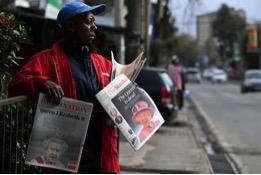Media Ownership a Threat to Press Freedom in Kenya
Submitted by fkakooza on

Unlike many African countries where state-owned media houses control the landscape, Kenya’s most influential media organisations are privately owned and this has significant implications for press freedom in the country.
The largest media organisations – Nation Media Group, Standard Media Group and Royal Media Services – own multiple newspapers and television and radio stations across the country, and their shareholders include powerful individuals and companies.
Judie Kaberia, Executive Director of the Association of Media Women in Kenya (AMWIK) and a former Capital FM reporter, says it is difficult to work with some private media owners to promote press freedom because they serve various interests.
“Media owners who have taken political sides are difficult to deal with when it comes to ensuring that journalists work in a free environment that can enable them report independently,” Kaberia says. She adds that these owners tend to work in favor of their candidates, which forces journalists to operate against the principles of objectivity and independence.
Kenya’s dominant media houses are on the Nairobi Stock Exchange and represent substantial business interests. For example, Nation Media Group, the largest private media organisation in East and Central Africa, has its major shareholder as the Aga Khan Foundation for Economic Development (AKFODE), which accounts for 46.66% shares. AKFODE has long-standing ties with the government of Kenya. Standard Media Group’s main shareholders include Gideon Moi, son of former president Daniel Arap Moi and currently the leader of the Kenya African National Union (KANU) party. The Moi family owns several companies and property spread across Kenya and oversees.
Several other media organisations in Kenya are owned by politicians or people close to the government, and subsequently, the state influences the appointment of their managers and editors. Politicians view media as efficient vehicles for electoral publicity, while the business community considers the same institutions as avenues for profit. Journalists in these organisations are aware of the invisible hand that feeds them and this not only affects their objectivity, but also forces them to practice self-censorship.
A reporter with the Royal Media Services who requested anonymity said it is commonplace for editors kill stories perceived to be critical of politicians or companies close to the owners.
“I feel demoralized whenever the editor trashes my stories just because they are about particular people affiliated to our media house,” the source said.
Nicholas Kipchumba, a reporter with Kass Media Group, also expressed his dissatisfaction with this kind of environment.
“The media has taken sides. At face value, you might think they are freely choosing which politician to cover. But if you think and look deeply, you will find it is about the state,” he said.
The smaller and supposedly more independent media actors, such as online news websites and community radio stations and newspapers have limited resources and find it difficult to operate independently because they rely on advertising revenue.
Most media houses in Kenya greatly rely on advertising revenue from government-controlled institutions and are vulnerable to pressure from government officials who may seek to influence their reporting. Advertising blackmail from the government weakens the media’s ability to operate independently. Government officials undermine press freedom under the guise of reducing public expenditure, yet in actual sense they are deliberately acting to silence media criticism.
The previous government led by former president Uhuru Kenyatta established a media-buying arm, the Government Advertising Agency (GAA), through which all government advertising is channeled. The GAA is a directorate under the state department of broadcasting and telecommunication of the ministry of Information, Communication and the Digital Economy, and is responsible for public sector advertising. Media houses that are ‘uncooperative’ with the state are regularly punished through withdrawal of government advertising, leaving them without revenue.
While there is some diversity in press ownership in Kenya, there are still significant challenges facing independent and diverse media in the country.
- 158 reads
